
View of Kuala Lumpur, capital city of Malaysia.
Asia has become a powerhouse in global markets, a trend that is only expected to grow over time. Asia’s economy contributed almost 40 percent of the world’s productive output in 2014, and accounted for nearly two thirds of global economic growth. Deeper market integration and liberalization in the region is critical to the global economy, which is why Atlas Network developed the Liberating Asian Enterprise project. This project encourages Atlas Network partners in Asia to conduct original research and marketing projects that focus on overcoming obstacles to market exchange and examining the sources of cronyism that undermine free, competitive markets.
“Economic reform and restructuring in many Asian countries has created tremendous trade and investment opportunities and a great consumer market in the region,” said Laura Liu, economic trade and policy advisor for Atlas Network. “However, the hard-to-measure factors such as government regulations, weak legal regimes, licensing procedures, and corruption still play a significant role in increasing costs of doing business and greatly undermine the region’s long-term economic development prospects.”
Despite decades of sustained economic growth, the cost of doing business in many Asian countries remains stifling to their local economies. On average, it takes up to 25 and 34 days respectively to start a business in Indonesia and the Philippines, compared to only three days in Singapore, which is the highest-ranked country (second only to the Hong Kong region of China) in the worldwide economic freedom rankings of both Atlas Network partners the Heritage Foundation and the Fraser Institute. To date, it takes up to 32 payments and 872 hours per year to complete all the tax-filing procedures required in Vietnam, while only five payments and 82 hours are required to complete an annual tax filing in Singapore. It is estimated that, by 2020, reducing existing trade barriers alone would result in a 17 percent increase in GDP for Bangladesh and Sri Lanka, a 15 percent increase for India, and a 5 percent increase for Pakistan.
Thus far, beginning in the middle of 2014, 10 think thanks from seven countries have completed research projects on numerous policy issues, including — but not limited to — barriers to entry, entrepreneurship and licensing, price controls, property rights, public spending, taxation, state finances, and trade barriers. As a result of the program, 30 of these research projects have been completed and are beginning to yield practical policy impact in their respective countries.
Centre for Public Policy Research (CPPR), an Atlas Network partner based in Kochi, India, published its study, “Liberalizing Liquor Trade in India,” in November 2014. The study found India to be one of the world‘s most restrictive places for trade and doing business. In 2014, India ranked 110 out of 152 countries, in terms of economic freedom and 133 out of 152 in the World Bank Group’s Doing Business rankings. Despite being the world’s fastest-growing market for alcoholic beverage consumption, trade in liquor has often been suppressed by taxes and other restrictive policies in India. Restrictive policies at the federal and state levels are often carried out under the concern that alcoholic beverages should be heavily regulated to prevent public health and safety issues related to drinking.
After research based on statewide statistics, CPPR has concluded that these policies are harmful to the consumers because they fuel more black market exchanges, increase corruption, raise prices, and lead to more public health concerns because of the prevalence of cheap, extremely poor-quality counterfeit products.
The study found that that an average Indian liquor consumer pays five to six times the manufacturing cost. High custom duties and liquor bans have pushed foreign liquor sold in star hotels 6 to 7 times higher than international prices. Liquor prices in India are significantly higher than 95 percent of the countries in the world. While the combined earning of the states and union territories (excise) from alcohol beverages in the 2011 fiscal year is estimated to be 4.67 billion USD, accounting for about 16 per cent of their own tax revenues.
[“Source- atlasnetwork”]


